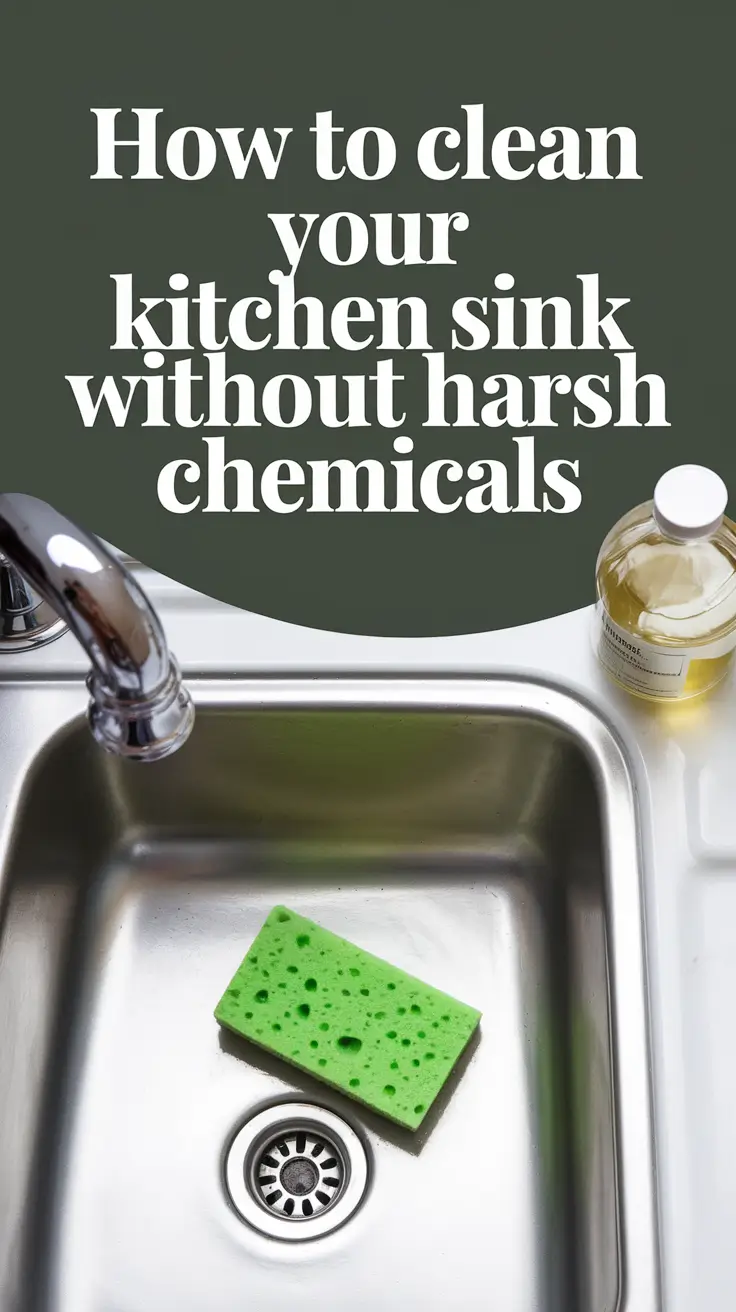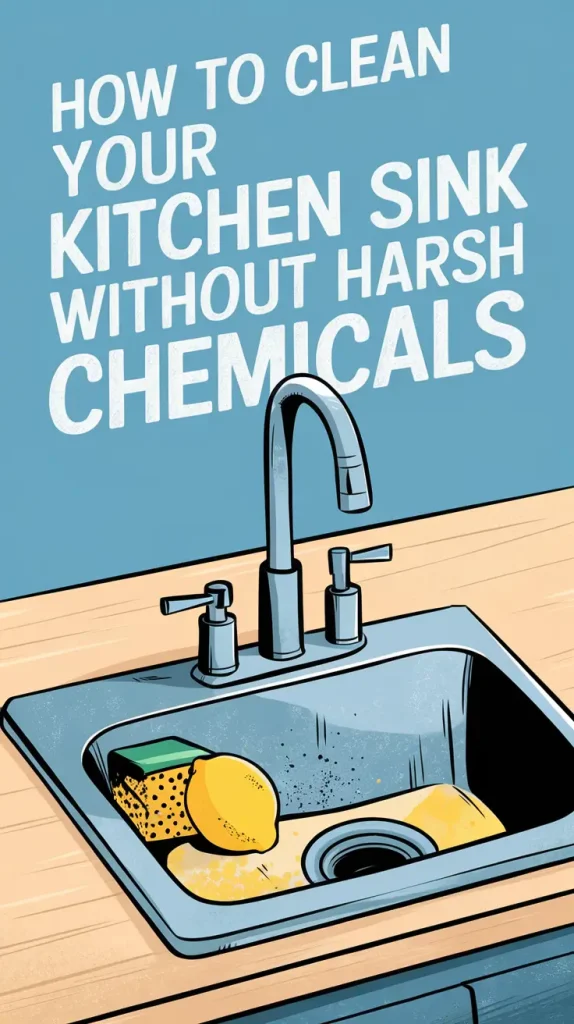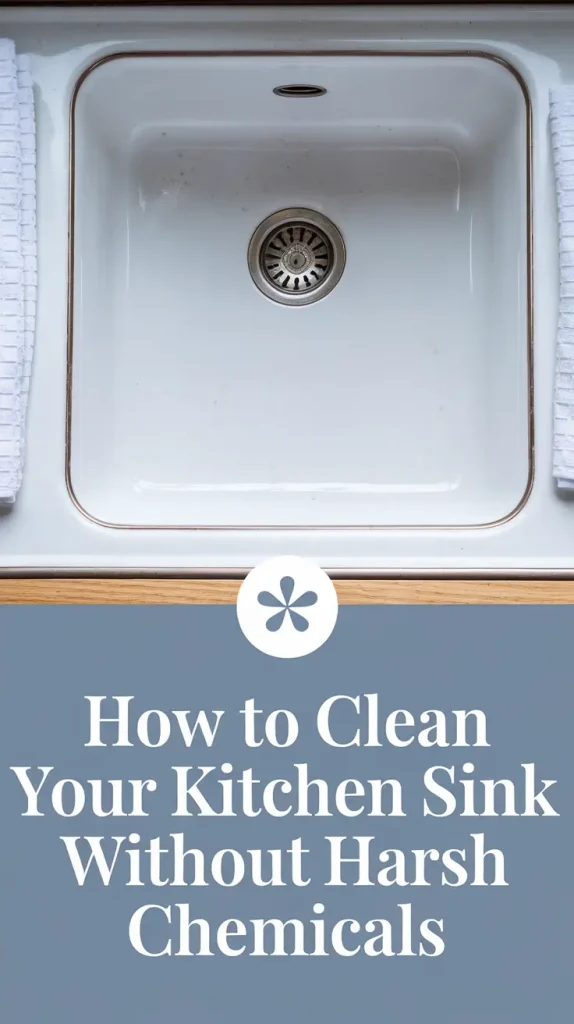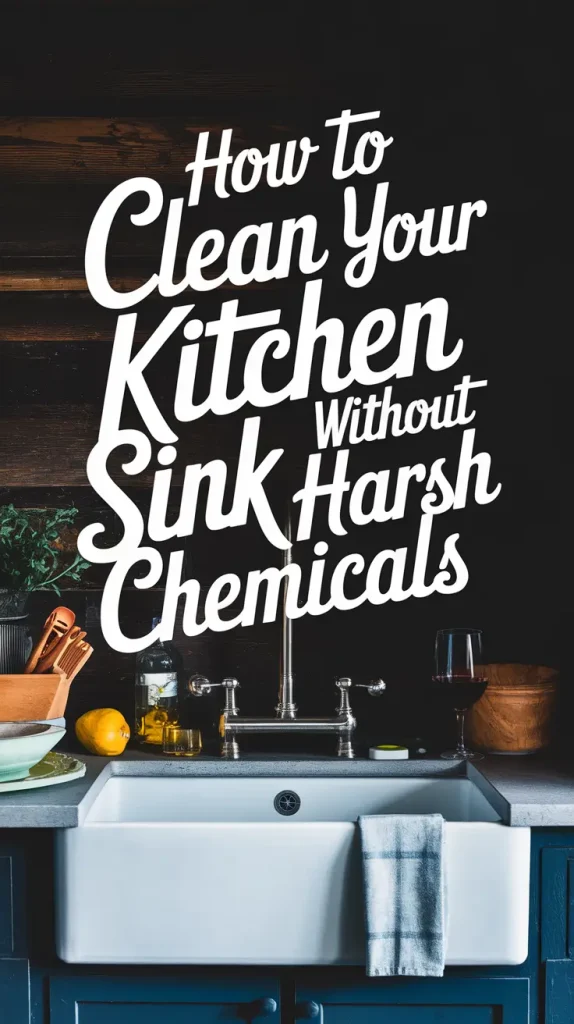How to Clean Your Kitchen Sink Without Harsh Chemicals

Have you ever washed your dishes in the sink after a meal, but noticed that the metal still smells bad and doesn’t get shiny, even after you clean it many times? I used to think I needed stronger products. More foam, more bleach, more effort. After all, my skin became irritated, I got a headache from the smells and I never felt that my sink was actually clean.
You’re not imagining it. The products we use to clean our homes can negatively affect our health as well as the environment. But here’s the good news: you don’t need harsh chemicals to have a sparkling, fresh-smelling kitchen sink.
This isn’t just a list of “DIY tricks.” I have found this method useful and it still helps me every week. If you’re looking for a safe, simple, and affordable way to reset your kitchen sink routine, let’s get into it.

Why I Stopped Using Harsh Chemicals in My Sink
I realized that the cleaning products I used were reducing the comfort in my home.
I first noticed a small, dry and itchy patch on my hand and it kept coming back. After I finished cleaning, my nose would get very uncomfortable. At a certain moment, I realized I was holding my breath whenever I poured cleaner into the sink. That didn’t seem right.
What’s Really Inside Those Bottles?
I decided to read the label. And wow—here’s what I found:
- Surfactants (SLS, SLES): Effective but often irritating to skin and eyes
- Chlorine bleach: Strong, yes, but also corrosive and toxic when mixed
- Artificial fragrances: Pretty in theory, but full of allergens
- Phosphates and ammonia: Linked to respiratory issues and environmental damage
It wasn’t just about a cleaner sink anymore. It was about cleaning consciously.
And that’s where everything changed.
What You Actually Need to Clean Your Sink Naturally
This is where it all shifted. Instead of reaching for another spray bottle with a childproof cap and a warning label, I built a small natural kit that works better than I imagined.
My Go-To Natural Sink Cleaning Staples
These are the items I always have on hand—and they’ve earned their place:
- Baking soda: The gentle scrubber that never scratches
- White vinegar: Dissolves grime and mineral deposits like magic
- Lemon juice: Adds shine, cuts grease, and neutralizes odors
- Boiling water: The ultimate rinse, especially down the drain
- Essential oils: I love tea tree for its antimicrobial powers, and lavender for scent
The best part? These ingredients are safe enough to use with bare hands and cost pennies compared to name-brand cleaners.
My 3-Step Natural Sink Cleaning Ritual
Let me show you how that worked out, step by step. This routine takes about ten minutes—but the clean feeling lasts for days.
3 Simple Steps to a Naturally Clean Sink
- Sprinkle and Scrub
Start by sprinkling a generous amount of baking soda all over your sink. Use a damp sponge to work it in small circles, paying extra attention to stained or dull areas. - Activate and Wait
Pour white vinegar gently over the surface. You’ll hear a satisfying fizz—that’s the reaction lifting away grime. Let it sit for 5–10 minutes. - Rinse and Refresh
Rinse with boiling water, and follow up with a splash of lemon juice or a few drops of essential oil for extra freshness.
It feels like giving your sink a spa treatment. Every time I do it, I’m reminded that cleaning doesn’t have to feel harsh or industrial—it can feel nurturing.

Mistakes I’ve Made (So You Don’t Have To)
Here’s something I wish I’d known sooner: even natural cleaning can go wrong if you’re not paying attention.
Things to Avoid with Natural Cleaners
- Don’t use vinegar on aluminum or cast iron: It can discolor or corrode
- Don’t pre-mix baking soda and lemon juice: The fizz happens before it hits the sink, losing effectiveness
- Don’t ignore your sponge: Dirty tools = dirty results. Wash or replace regularly
These little tweaks made my routine faster, easier, and more effective. And honestly? Less frustrating.
How Chemical-Free Products Compare (and Why I Switched)
I used to believe natural meant “less effective.” But once I saw the side-by-side difference, I couldn’t unsee it.
Cleaners Showdown: Chemical vs. Natural
| Feature | Conventional Cleaners | Natural Alternatives |
|---|---|---|
| Cleaning Power | Fast but aggressive | Slower, gentler, effective |
| Skin Impact | Often causes irritation | Safe on bare hands |
| Smell | Sharp and synthetic | Fresh, mild, customizable |
| Environmental Impact | Polluting ingredients | Biodegradable and safe |
| Price | $5–$10 per product | Often under $2 total |
That’s when I realized—I wasn’t sacrificing results. I was just removing the side effects.
What Helped Me Stick With It
Switching products is one thing. Building a habit? That’s where the magic happens—or doesn’t.
How I Made It Part of My Routine
This started as an experiment. It became a habit when I did these three things:
- I picked a “cleaning day.” For me, it’s Friday. A quick reset before the weekend feels good.
- I kept the tools in one spot. No digging = no excuses.
- I romanticized it. Music on, candle lit, sleeves rolled—cleaning became a ritual, not a chore.
And you know what? That shift in mindset made all the difference.
There’s something deeply satisfying in doing something small, fully and mindfully.
Bonus: Drain Maintenance Without the Drain Cleaner
This is where people usually reach for the big guns—and the chemical fumes. But there’s another way.
Here’s what I do once a month to keep things flowing smoothly (and smelling fresh):
- Pour half a cup of baking soda down the drain
- Add one cup of vinegar and cover the drain to keep the fizz inside
- Wait 10–15 minutes, then flush with a full kettle of boiling water
It works. It’s silent. It smells like nothing—and that’s how I know it’s clean.
Final Thoughts
A clean sink should not make your eyes burn, your hands feel dry or make you feel bad about the environment. It ought to be a new beginning—a little bit of luxury every day. Since I started using natural ways, I clean more regularly, worry less and enjoy the whole experience more.
This isn’t about being perfect. You should pick a routine that suits your home and your principles and make sure you stick to it.
✨ So tell me:
Have you ever tried ditching the harsh stuff?
Pin this if you’re ready to give your sink a non-toxic glow-up.
Or drop a comment: What’s one small home habit that changed everything for you?

